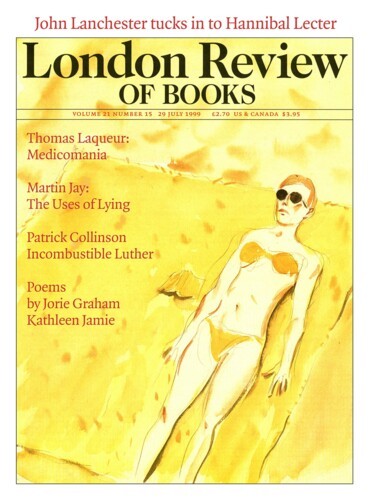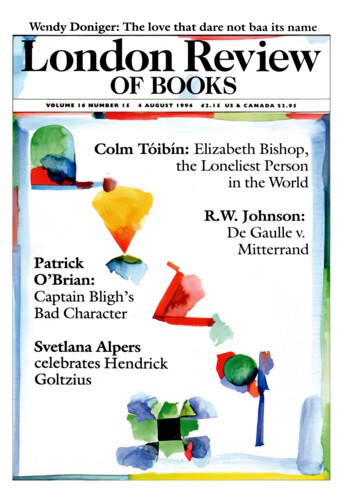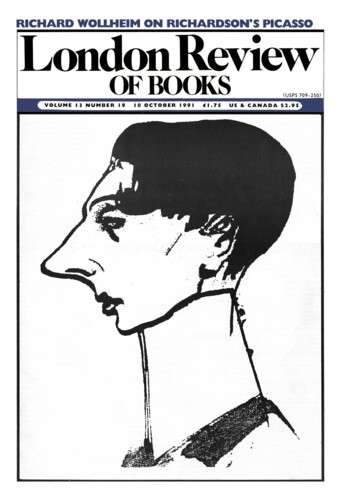Mary-Kay Wilmers
Mary-Kay Wilmers helped to found the LRB in 1979 and was its editor for many years. Her pieces have been collected as Human Relations and Other Difficulties. She is now the paper’s consulting editor.
Diary: Brussels
Mary-Kay Wilmers, 29 July 1999
‘Adjustment, no matter how comfortable it appears to be, is never freedom.’ David Reisman said that in The Lonely Crowd, a work of academic/pop sociology, published in the US in the late Forties; much read and remarked on at the time, and now forgotten. I looked it up the other day when I was due to say something at the South Bank Centre in connection with the Cities on the Move exhibition at the Hayward. Reisman divided social behaviour into three categories: ‘anomic’, ‘adjusted’ and ‘autonomous’. ‘Anomie’ is bad – everyone knows that – and something that has long been associated with urban life. But who could be sure, as David Reisman was, that an ‘autonomous’ citizen, no matter how uncomfortable, was better off than one who had taken the trouble to adjust – unless they’d told themselves that adjustment was un-American, the sort of feebleness Charlton Heston might despise? And if you could choose one or other way of being which would you go for? And where would you live?’‘
South African Observations
4 August 1994
Diary: Distant Relatives
Mary-Kay Wilmers, 4 August 1994
A distant relative of mine was a general in the KGB. ‘As long as I live,’ Stalin said of him, ‘not a hair of his head shall be touched.’ Stalin didn’t keep his word – which can’t have been wholly surprising even then. Unlike many of his colleagues, however, my relative wasn’t shot: he was beaten and tortured and kept in prison for 12 years. He died in 1981 with – I’ve been told – a portrait of Stalin by his bed.’
Diary: The Menopause
Mary-Kay Wilmers, 10 October 1991
I have complained a lot about men in my time. In fact, I do it more and more. But I have never been part of what used to be called the women’s movement and those who have or who are, or who have never wanted to be, would probably consider me a retard of some kind. I didn’t do consciousness-raising with my sisters in the late Sixties. I was married at the time and it seemed to me that if my consciousness were raised another millimetre I would go out of my mind. 1 used to think then that had I had the chance to marry Charles Darwin (or Einstein or Metternich) I might have been able to accept the arrangements that marriage entails a little more gracefully. In the Eighties, long since divorced, I decided that marriage to Nelson Mandela (or Terry Waite) would have suited me fine.
Podcasts & Videos
Analogous Patisseries
Mary-Kay Wilmers and Andrew O’Hagan
Mary-Kay Wilmers, who retired as editor of the LRB last month, talks to Andrew O’Hagan about her career, first at Faber and Faber, then the Listener, then for 42 years at the London Review of Books....
Early and Late Kermode
Stefan Collini, Mary-Kay Wilmers, Thomas Jones and Andrew O’Hagan
Stefan Collini talks to Thomas Jones about the life and work of Frank Kermode, and Mary-Kay Wilmers remembers him as a contributor to the LRB.
The LRB at 40
Mary-Kay Wilmers, Alan Bennett, Andrew O’Hagan, John Lanchester, Yun Sheng and Nicholas Spice
We look back at 40 years of the LRB in our anniversary event at Conway Hall.
Long-Form Essays in the Digital Age
Mary-Kay Wilmers, Andrew O’Hagan, Ben Eastham and Sarah Howe
Mary-Kay Wilmers, Andrew O’Hagan and Ben Eastham talk to Sarah Howe about ‘Long-Form Essays in the Digital Age’.
Mary-Kay Wilmers and Andrew O’Hagan: The Eitingons
Mary-Kay Wilmers and Andrew O’Hagan
Mary-Kay Wilmers, editor of the LRB, talks to Andrew O’Hagan about her book The Eitingons, a story of the twentieth century told through the lives of her ancestors: a fur-trader, a psychoanalyst and...
Read anywhere with the London Review of Books app, available now from the App Store for Apple devices, Google Play for Android devices and Amazon for your Kindle Fire.
Sign up to our newsletter
For highlights from the latest issue, our archive and the blog, as well as news, events and exclusive promotions.




